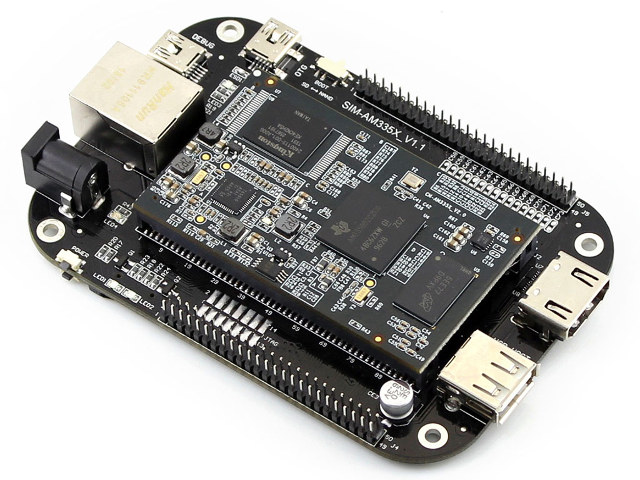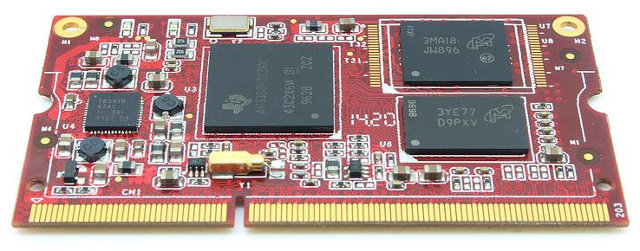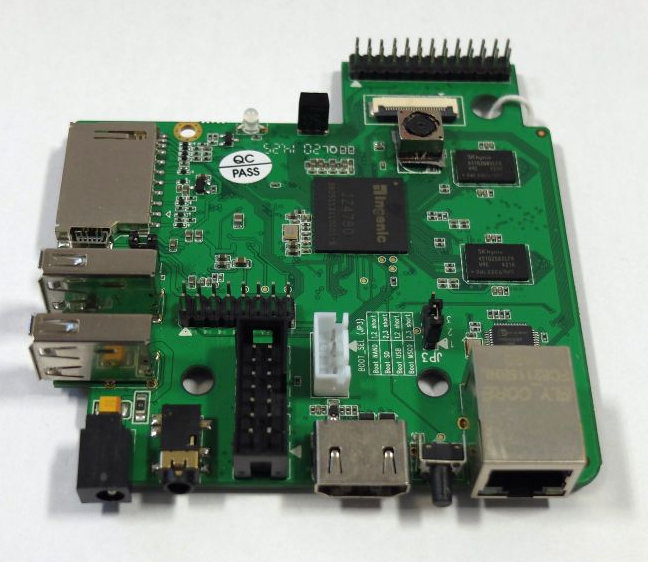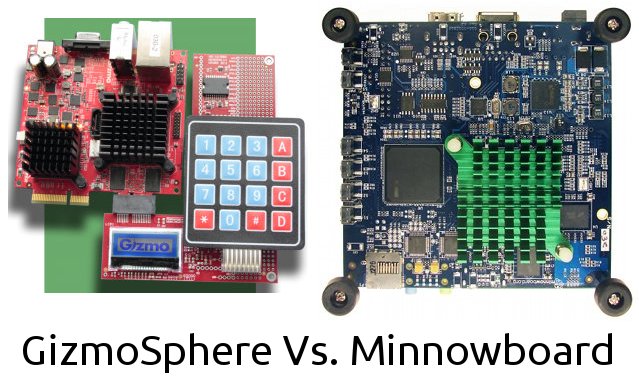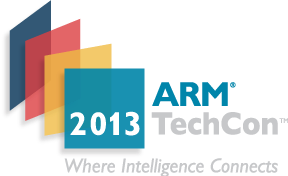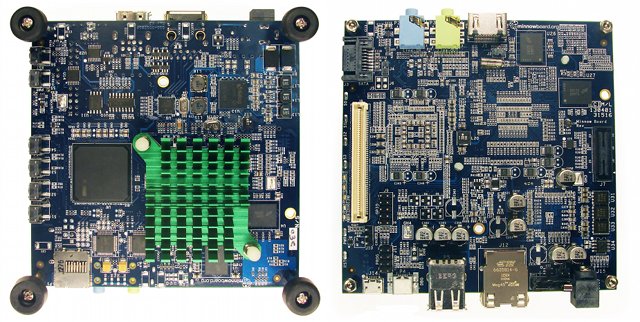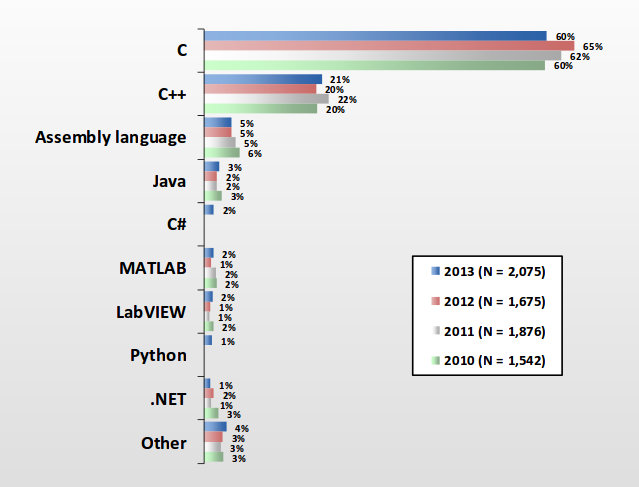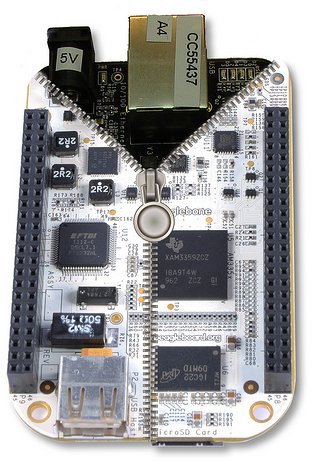Haoyu Electronics brought us several Allwinner and Rockchip Marsboard in the past few years, and now they’ve released a version based on Texas Instruments AM335x processor, with a form factor and features similar to the Beaglebone Black, but comprised of a baseboard and system-on-module. Marsboard AM335x board specifications: CM-AM335x System-on-module: SoC – Texas Instrument AM335x (AM3358) ARM Cortex A8 processor @ 1Ghz with SGX530 3D GPU System Memory – 512MB DDR3 SDRAM Storage – 4GB eMMC Flash Connectivity – 10/100M Ethernet PHY (LAN8710A) SoM Connectors – two 50×2 pin headers, 1.27mm pitch Misc – Power Indicator LED Power Management Unit – TPS65910 SIM-AM335X Baseboard Video Output – HDMI type A socket (via TDA19988 LCD to HDMI converter) Storage – mircro SD slot (bottom of the board) Connectivity – RJ45 connector for Fast Ethernet USB – 1x USB 2.0 Host port, 1x micro USB port Debugging – 14-pin JTAG interface (not […]
TI Sitara based GOEMBED Systems-on-Module and Single Board Computers with BeagleBone Capes Support
GOEMBED is a startup funded by engineers previously working for Embest Shenzhen, based in Longhua district in Shenzhen, and specialized in embedded boards and modules. They currently have board and modules based on Freescale i.MX6 and Texas Instruments Sitara processors, but I’ll focus on the TI products in this post, including one of their single board computers that supports BeagleBone capes. CM3352 and CM3358 Systems-on-Module CM335x Series modules specifications: SoC – Texas Instruments Sitara Cortex A8 AM3352 @ 800 Mhz or AM3358 @ 1.0 GHz System Memory – 512 MB Micron DDR3 chip Storage – 2 to 4 GB eMMC depending on model PMU – TI TPS65910A3 Dimensions – 67.5 x 36.5 mm Temperature Range – Commercial: 0° to 70° C or Industrial: -40° to 85° C The modules are said to support Linux 3.x, Android 4.x, Ubuntu, Angstrom, Debian, WinCE 6.0/7.0, and uCOS operating systems. SBC335x Single Board Computers […]
MIPS Creator CI20 Development Board Powered by Ingenic JZ4780 SoC
There are plenty of ARM based development boards running Linux and Android, but with MIPS it’s a different story. Microchip does have some affordable development board powered by their MIPS MCUs, but these don’t have the hardware specs to run Linux based operating systems, and Ingenic Newton Platform for wearables can run Android and Linux, but it appears to be reversed to companies with virtual no documentation. There are some MIPS platform running OpenWRT on hardware such as routers or Wi-Fi boards, but these can’t be considered fully supported development boards. But Imagination Technologies is trying to make MIPS more relevant, first by launching Prpl developers’ community, and MIPS Creator CI20 development board powered by Ingenic JZ4780 dual core MIPS32 (Xburst) core processor with PowerVR SGX540 GPU should soon be available with complete documentation and source code. Let’s go through the hardware specifications first: SoC – Ingenic JZ4780 dual core […]
GizmoSphere vs Minnowboard – AMD and Intel x86 Embedded Boards Comparison
The Gizmo Explorer Kit is an embedded kit based on a development board powered by AMD G-Series G-T40E dual core APU that’s available since the beginning of the year. The Minnowboard is another new x86 embedded board, but this time based on Intel Atom E640 processor. Both cost $199, so a side-by-side comparison might be useful,and GizmoSphere team released a comparison table for both board, and is offering free shipping for the week with “Sharkweek2013”. Let’s have a look. The company only provided the table in image format, so I’ll reproduce it “as is” below, and see if there may be some correction or addition afterwards, the table has been designed by one of the competitors. The parts in yellow are supposed to highlight advantages of the GizmoShpere against the Minnowboard, but they conveniently “forgot” to highlight advantages of the Minnowboard. [Update 13/08/2013 – Gizmo guys have updated their table […]
ARM TechCon 2013 Schedule – ARM Servers, Internet of Things, Multicore, Hardware and Software Optimization and More
ARM Technology Conference (TechCon) 2013 will take place on October 29 – 31, 2013, in Santa Clara, and the detailed schedule for the event has just been made available. In the previous years, the conference was divided into Chip Designs day (1 day), and the other 2 days were reserved for Software & System Design, but this year it does not appear to be the case. Whether you’ll be able to attend the event or not, it’s worth having a look at what will be discussed there in order to have a better understanding of what will be the key ARM developments in the near future in terms of hardware and software. There will be around 90 sessions categorized into 15 tracks: Accelerating Hardware Development – This track explores the resources, tools, and techniques that designers can employ to quickly bring hardware to market. Topics include multicore design, ARM IP, […]
$199 Minnowboard is an Open Source Embedded Board Powered By Intel Atom E640 Processor
Minnowboard is a development board designed by Intel’s Open Source Technology Center, powered by Intel Atom E640 processor @ 1GHz with 1GB RAM, SATA2 and Gigabit Ethernet support, and several embedded I/O such as SPI, I2C and CAN, and that ships with Angstrom Linux distribution. Minnoboard Specifications: Processor – Intel Atom E640 @ 1GHz (32bit) Chipset – EG20T Intel Platform Controller Hub GPU – Integrated Intel Graphics Media Accelerator (GMA) 600 System Memory – 1 GB DDR2 RAM Storage – 4 MB SPI Flash (for Firmware), micro SD card slot and SATA Video Output – SDVO to DVI (over HDMI connector) Audio – 1/8″ (3.5mm??) jack line Input and Output I/O: 1x SATA2 3Gb/sec 2x USB host ports + 1x micro USB device 1x Serial debug via Serial (UART 0) to USB conversion (mini-USB-B port) 10/100/1000 Ethernet PCI Express Expansions: 8x Buffered GPIO pins 2x GPIO controlled LEDs 4x GPIO […]
2013 Embedded Market Study – Software Development & Processors
UBM releases a study of the embedded market every year, by surveying over 1,000 embedded professional every year. They’ve just published their 2013 Embedded Market Study (85 pages report), after surveying over 2,000 engineers and managers, so let’s see whether anything has evolved in the software development and processor space compared to 2012. Again this year, most respondents are based in the US (62%), followed by Europe (20%), and Asia (12%). C/C++ languages still rule the embedded world with 81% market share, although a little less than last year (85%), assembler is a distant third (5%). Interestingly, the average size of development teams seems to have shrunk from 15.9 in 2012 to 14.6 in 2013, the average project being composed of 4 software engineers, 2.9 hardware engineers, 2.7 firmware engineers, 2 QA/Test engineers, 1.5 system integrators, and 1.5 with other functions. About a third of project last less than 6 […]
A New, Faster, and Cheaper Beaglebone is On its Way
Beaglebord.org community is currently teasing a new Beaglebone on their website. At this time information is not complete, but we already know it will be “significantly cheaper” than the existing Beaglebone, feature a processor with higher performance (Albeit the picture shows TI Sitara AM3359 which is about the same as AM3358 + Ethercat), and come with 512 MB DDR3L RAM (instead of 256 MB DDR2), 2GB eMMC Flash, and onboard HDMI output. The new Beaglebone will keep supporting Angstrom, Ubuntu and other Linux distributions. Hardware expansion boards (cape) designed for the old model will still be fully compatible with the new Beaglebone. You’ll need to wait April to get hold of the new Beaglebone. Until then, you can register your interest on Element14/Farnell to be informed when the board becomes available. Another way to find out more is to attend the Embedded Linux Conference 2013 which is taking place right […]


